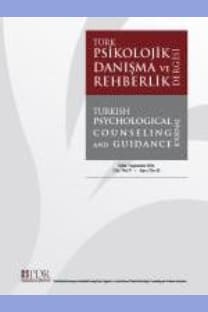Üniversite Öğrencilerinin Amaç Tarzlarının ve Öğretmenlerinin Özerklik Destekleyici Davranışlarına İlişkin Algılarının Öğrencinin Motivasyonu ve Akademik Davranışlarıyla İlişkisi
Bu araştırmanın amacı üniversite öğrencilerinin öğretmenlerinin özerklik destekleyici davranışlarına ilişkin algılarının ve akademik amaç tarzlarının öğrencilerin motivasyon ve akademik davranışlarıyla ilişkilerini araştırmaktır. Öğrencinin motivasyonunu belirlemek amacıyla içsel motivasyon ve sınav kaygısına ilişkin ölçümler alınırken, derin strateji kullanımı ve ezber davranışları akademik davranışlarını belirlemek amacıyla ölçülmüştür. Sonuçlar, öğretmenini özerk olarak algılayan üniversite öğrencilerinin öğretmenini özerk olarak algılamayan öğrencilere nazaran daha yüksek içsel motivasyona sahip olduklarını, daha fazla derin strateji kullandıklarını ve daha az ezber yaptıklarını ortaya çıkarmtır. Bununla birlikte öğretmenin özerklik algısının üniversite öğrencilerinin akademik davranışlarına etkisi amaç tarzlarının etkisiyle karşılaştırılmalı olarak incelenmiş ve sonuçlar üniversite öğrencilerinin akademik davranışlarının belirlenmesinde bireyin amaç tarzının daha önemli bir yer tuttuğunu ortaya çıkarmıştır. Aynı zamanda, özerklik desteği algısı ile amaç tarzı arasında etkileşim gözlenmiş ve bu etkileşimler tartışılmıştır.
Relations of University Students' Goal Orientations and Perception of Teacher's Autonomy Support to Students' Motivation and Academic Behaviors
Relations of University Students` Goal Orientations and Perception of Teacher`s Autonomy Support to Students` Motivation and Academic Behaviors This study explored the relation of college student` achievement goal orientations and perception of teacher`s autonomy support to students` motivation and academic behaviors including instrinsic motivation, deep strategy use, test anxiety and memorization. Perception of teachers` autonomy support was best predictive of instrinsic motivation and deep strategy use. When the variances accounted by goal orientations were taken into consideration in order to compare and constrast the effect of perception of autonomy support and goal orientations on achievement behaviors, college students` personal goal orientation remained as the best predictor of all four academic behaviors. There was also interaction between perception of autonomy support and goal orientaions. Each of these interactions and their implications were discussed.
___
- Belmont, M., Skinner, E., Wellborn, J., & Connell, J.R (1992). Teacher as Social Context (TASC): Two measures of teacher provision of involvement, structure, and autonomy support: Student report measure (Tech. Rep). Rochester, NY: University of Rochester.
- Deci, E. L., Nezlek, J., & Sheinman, L. (1981). Charecteristics of the rewarder and instrinsic motivation of re-wardee. Journal of Personality and Social Psychology, 40, 1-10.
- Deci, E. L., & Ryan, R. M. (1987). The support of autonomy and the control of behavior. Journal of Personality and Social Psychology, 53, 1024-1037.
- Deci, E. L., Schwartz, A., Sheinman, L., & ve Ryan, R. M. (1981). An instrument to assess adults' orientations toward control versus autonomy with children: Reflections on instrinsic motivation and perceived competence. Journal of Educational Psychology, 73, 642-650.
- Dweck, C. S., & Elliot, E. S. (1988). Goals: An approach to motivation and achievement. Journal of Personality and Social Psychology, 66, 604-609.
- Dweck, C. S., & Leggett, E. L. (1988). Social cognitive approach to motivation and personality. Psychological Review, 95(2), 256-273.
- Elliot, A. J., & Harackiewicz, J. M. (1996). Approach and avoidance achievement goals and intrinsic motivation: A Mediational analysis. Journal of Personality and Social Psychology, 70,461-475.
- Flink, C., Boggiano, A. K., Main, D. S., Barrett, M., & ve Katz, P. A. (1992). Children's achievement related behaviors: The role of extrinsic and instrinsic motivational orientations. In A. K. Boggiano & T. S. Pittman (Eds.), Achievement and Motivation: A Social- Developmental Perspective (pp.189-214). New York: Cambridge University Press.
- Koestner, R., Ryan, R. M., Bernieri, F., & Holt, K. (1984). Setting limits on children's behavior: The differenta.il effects of controlling versus informational styles on instrinsic motivation and creativity. Journal of Personality, 52, 233-248.
- Meece, J. L., Blumenfeld, P. C., & Holt, R. H. (1988). Students' goal orientations and cognitive engagement in classrooQi activities. Journal of Educational Psychology, 80 (4), 514-523.
- Middleton, M., & Midgley, C. (1997). Avoiding the demonstration of lack of ability: An underexplored aspect of goal theory. Journal of Educational Psychology. 89(4), 710-718.
- Miller, R. B., Behren, J. T., Greene, B. A., & Newman, D. (1993). Goals and perceived ability: Impact on student valuing, self-regulation, and persistence. Contemporary Educational Psychology, 18(1), 2-14.
- Miller, R. B., Greene, B. A., Montalvo, G. P., Ravin-dran, B., & Nichols, J. D. (1996). Engagement in academic work: The role of learning goals, future consequences, pleasing others and perceived ability. Contemporary Educational Psychology, 21, 388-422.
- Özgüngör, S. (2003). Mükemmelliyetçilik ve Özerklik Destekleyici Davranışların Amaç Tarzları ile ilişkisi. Eğitim ve Bilim, 28(127), 25-30.
- Pedhazur, E. J., ve Schmelkin, 1. P. (1991). Measurement, design, and analysis: An integrated approach. Hilsdale, NJ: Erlbaum.
- Schneider, W., ve Pressley, M. (1997). Memory development between two and twenty (2nd. Ed.) Mahwah,Nj: Er-lbaum.
- Smiley, P. A., & Dweck, C. S. (1994). Individual differences in achievement goals among young children. Child Development, 65(6), 1723-1743.
- Wolters, C. A., Yu, S. L., & Pintrich, P. R. (1996) The relation between goal orientation and students' motivational beliefs and self-regulated learning. Learning & Individual Differences. 8(3), 211-238.
- ISSN: 1302-1370
- Başlangıç: 1990
- Yayıncı: -
Sayıdaki Diğer Makaleler
Çocuk Yetiştirme Stilleri ve Benlik Saygısı Arasındaki İlişki
BasariILI Bir BankacIda BulunmasI Beklenen Kişilik Özellikleri
İlişkilerde İnanç Envanterinin (IIE) Geliştirilmesi: Geçerlik ve Güvenirlik Çalışması
Sınıf Rehberliği Öğrenme Yaşantılarının Düzenlenmesi
Deprem Stresiyle Basa Çıkmanın İyimserlik ve Cinsiyete Göre İncelenmesi
